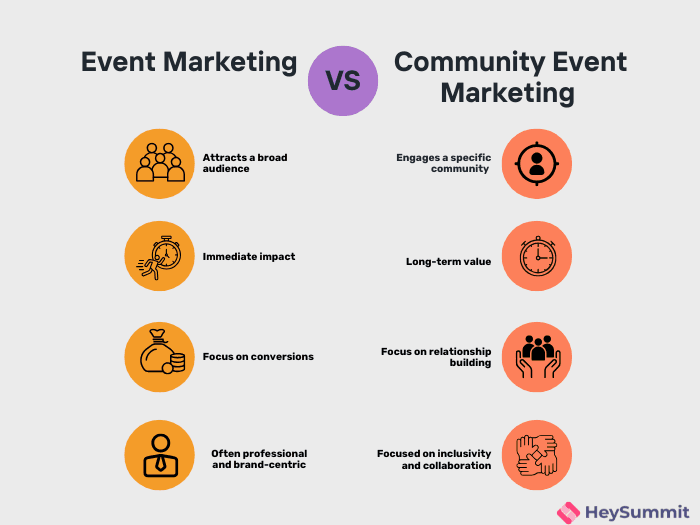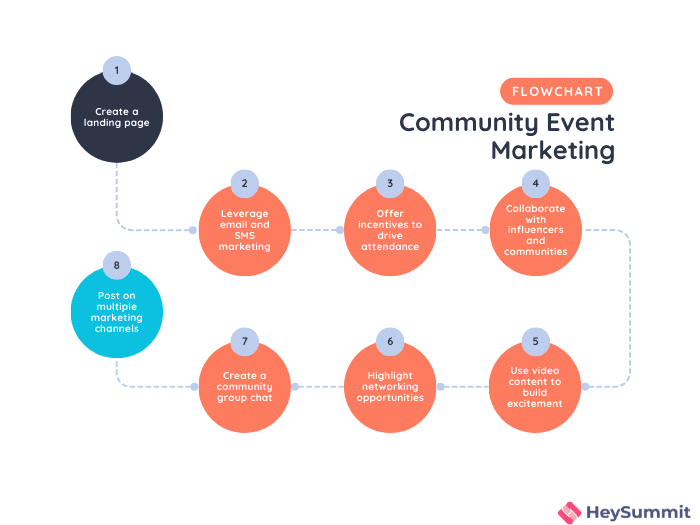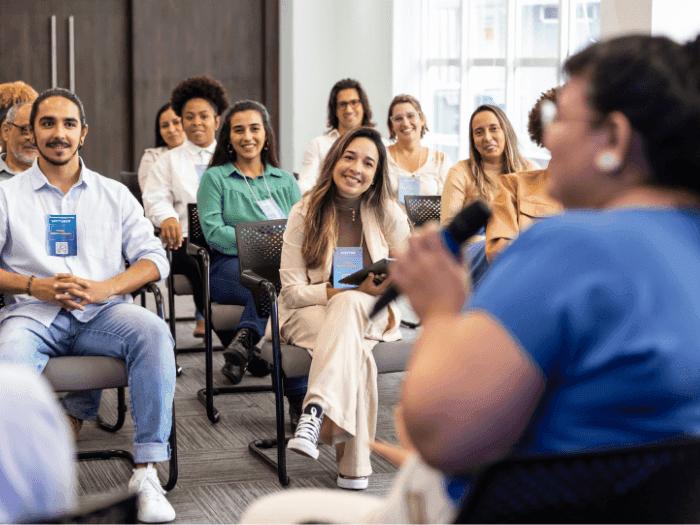The Complete Guide to Marketing Community Events [10 Easy Steps]
Astley Cervania
Content Contributor, HeySummit
Marketing a community event can feel like a daunting task, especially if you're on a tight budget and don’t have the resources of a big company.
But here’s the good news: promoting an event doesn’t have to break the bank or require a complicated tech stack. And that's what we're about to show you with this guide.
We'll walk you through a simple plan to help you promote your event, create a meaningful experience, and grow an engaged community - all while keeping things simple and cost-effective!
What Is a Community Event?
A community event is a gathering or activity organized to bring people together around a shared interest, purpose, or cause. The goal is to foster connections, build engagement, and strengthen a sense of community.
They can take place in-person, online, or as hybrid events.
Types of community events
Workshops and webinars: Educational sessions focused on skill-building, professional development, or sharing knowledge.
Networking events: Gatherings aimed at connecting individuals for professional or social purposes.
Fundraisers and charity events: Activities that bring people together to support a cause, including auctions, donation drives, or challenges.
Social gatherings: Events purely for social interaction, like online happy hours, trivia nights, or community meetups.
Product launches or demos: Showcasing new products or services to engage your community and gather feedback.
Need more inspiration? Explore more community event ideas here.
The Difference Between Event Marketing and Community Event Marketing

When it comes to getting your brand out there, it’s essential to know the difference between event marketing and community event marketing - because they’re not quite the same!
Community event marketing is all about creating a deeper connection with your audience. Its primary focus is building a loyal customer base rather than making quick sales.
Community leaders focus on building long-term relationships by fostering a sense of belonging and engaging with people more personally.
The goal? To encourage people to attend a space where everyone feels genuinely connected to your brand.
Event marketing is typically more focused on creating buzz. The goal is to draw in new potential customers, generate leads, and boost brand awareness by delivering a memorable experience. It’s perfect for attracting new faces and converting them into customers.
How to Promote a Community Event in 10 Steps

We'll go through 10 strategies that work for both in-person and online community events.
Make sure to add these to your planning process as you're creating a virtual event for smoother implementation.
1. Create a landing page
A landing page is a website page where you send potential attendees to learn more about your event and sign up.
The good news? You don’t need to be a web design expert to create one!
You can do this using a Content Management System (CMS) or a virtual event platform that offers a landing page builder.
Here are the key elements every successful landing page should include:
Unique Value Proposition (UVP)
Clearly explain why your event is worth attending.
Focus on what sets it apart: is it the expert speakers, the exclusive content, or the unique community experience?
A strong UVP answers the question, “What’s in it for me?”
Compelling Call-to-Action (CTA) buttons
Your CTAs should be clear, concise, and actionable. Instead of generic phrases like “Register,” try something more engaging like “Secure Your Spot Today” or “Join the Community.”
Event agenda and schedules
Create a detailed schedule to help attendees know exactly what to expect. Highlight key sessions, workshops, and breaks to show the value of each segment.
Easy-to-fill registration form
Keep it simple - only ask for essential information like name, email, and organization. The fewer fields, the higher your conversion rates.
Also integrate social sign-ups (like Google or LinkedIn) to make registration even faster.
Speaker bios
Showcase your speakers’ expertise with brief bios, professional headshots, and any notable achievements. This helps build credibility and excitement around the event.
Testimonials
Include quotes, testimonials, or case studies from past attendees to build trust. Honest feedback shows that your event delivers on its promises and encourages new attendees to join.
Pro Tip: Speed up the landing page design process with HeySummit. It comes with drag-and-drop builders, templates, and pre-designed themes (no coding needed!)
2. Create an email sequence
After setting up a landing page, collect email addresses from people interested in your event. Then, use those contacts to promote your community event with a strategic email sequence.
Here's a sample email marketing sequence you can follow:
Email 1: Announcement
Timing: Send 4-6 weeks before the event.
Introduce your event with excitement! Share the basics - date, time, location, and purpose. Highlight what makes the event unique and why it’s a must-attend.
Pro Tip: Include a clear call-to-action (CTA) button like “Register Now” or “Save Your Spot” to make it easy for recipients to sign up immediately.
Email 2: Early reminder
Timing: Send 2-3 weeks before the event.
Remind your audience about the upcoming event and emphasize the benefits of attending. Also, share a sneak peek of what they can expect, such as session topics or exclusive giveaways.
Pro Tip: Include a testimonial or quote from a past attendee to build credibility and excitement.
Email 3: Speaker spotlight
Timing: Send 1-2 weeks before the event.
Feature your keynote speakers with short bios and professional photos to create buzz. Let your audience know why these speakers are experts in their fields and what insights they’ll share.
Pro Tip: Use engaging subject lines like “Meet Our Keynote Speaker: [Name]” to boost open rates.
Email 4: Last chance to register
Timing: Send 1-2 days before the event.
This is your final push! Create a sense of urgency with phrases like “Last Chance” or “Don’t Miss Out.” Emphasize that time is running out to secure their spot.
Pro Tip: Adding a countdown timer in the email can create urgency and encourage immediate action.
Email 5: Thank You and Follow-Up
Timing: Send 1-2 days after the event.
Show appreciation to your attendees by thanking them for their participation. Share event highlights, photos, or even a short video recap. Use this opportunity to promote upcoming events or ask for feedback to improve future experiences.
Pro Tip: Encourage attendees to share their experiences on social media with a branded hashtag to extend the event’s reach.
3. Incentivize attendees
Incentivize attendees to register for the event or to reach out to their friends and family so that you can connect with a broader audience.
Here are some effective incentives to drive registrations and referrals:
Referral discounts: Encourage attendees to bring their friends, family, or colleagues by offering a discount for every person they refer. For example, “Invite a friend and both of you get 20% off your tickets!”
Early bird discounts: Reward those who sign up early with reduced ticket prices. Offering early bird discounts creates a sense of urgency and helps you secure registrations ahead of time. For example, “Sign up before [Date] to save 30% on your ticket!”
Online giveaways: Host a giveaway to generate buzz and encourage social sharing. For example, ask people to tag friends, share your event post, or use a branded hashtag to enter the competition.
Exclusive benefits: Highlight unique perks that attendees will receive by joining your event, such as VIP seating, access to a private Q&A session with speakers, or a downloadable resource pack.
4. Collaborate with influencers
Influencers have their own large network that you could tap into. So, collaborating with the right ones for your brand is a great way to increase brand awareness and attendance rates.
Here’s how you can make the most of these collaborations:
Co-create valuable content: Work together on valuable content that resonates with your audience. This could include a podcast episode, a YouTube video, or a live Q&A session that addresses your community’s pain points or interests.
Amplify social media promotion: Have the influencers share event-related posts, stories, or even countdowns on platforms like Instagram, LinkedIn, or TikTok. Make sure they tag your brand and use your event’s hashtag to amplify reach.
Create engaging short videos (Reels, TikToks, Shorts): Short-form content captures attention quickly and drives excitement. These could include sneak peeks of the event agenda, speaker introductions, or highlights of what attendees can expect.
5. Collaborate with other communities
Collaborate with communities that share similar interests to reach a wider (and more engaged) audience - without doubling your workload!
Here are some fun ways to collaborate:
Co-host an event: Join forces with another community for a joint event that can expose your brand to a whole new group of potential attendees. For example, if you're planning a webinar on digital marketing, why not partner with a community focused on small business growth?
Collaborate with local businesses: If you’re planning something local, partner with nearby businesses. They get to showcase their space, and you get access to their loyal customers. For instance, you could team up with a popular café or coworking space to host a casual networking meetup.
Bring on sponsors: For example, if you’re hosting an online conference, consider partnering with a software company that aligns with your theme. They get exposure to your attendees while you get a little extra support (and possibly funding) to make your event even better.
6. Post video content
Video content is a fantastic way to capture the excitement of your event.
Compared to written content, videos bring a personal, human touch that helps your audience connect on a deeper level. Plus, they’re more likely to grab attention on social media and keep viewers engaged!
Here are some video ideas to help your community event promotion:
Speaker or performer introductions
Epic trailers (a great example is the trailers Steven Bartlett uses for his podcast, Diary of a CEO.)
Q&A highlights
Behind-the-scenes footage
Once you’ve created your video content, don’t forget to share it on different social media platforms!
7. Highlight networking opportunities
Let’s face it: whenever we’re invited to an event, the first question that pops into our minds is, “What’s in it for me?” And for many attendees, the answer often lies in one key benefit - networking.
People love connecting with like-minded individuals, sharing ideas, and building relationships - especially for industry leaders or peers who can inspire or collaborate with them.
If your event offers great networking opportunities, you’re already one step closer to getting people excited to attend.
Here are some networking activities to promote your event:
Group lunches: Provide seating arrangements that mix people from different industries or roles to encourage diverse networking opportunities.
Icebreaker activities: For professional events, opt for something industry-relevant yet lighthearted.
Meet-and-greet sessions: Use badges or color-coded lanyards to indicate areas of interest or expertise.
Roundtable discussions: Assign moderators to guide the discussions and make sure everyone gets a chance to contribute.
8. Send SMS reminders
Text messages have significantly higher open rates compared to emails. In fact, 98% of recipients are likely to read a text message.
With stats like that, you can feel confident that your message will be seen.
Here are a few examples of how you can use SMS reminders to keep your attendees informed:
Monthly event reminder
“Don’t forget to join us for our monthly town hall meeting tonight at 7 PM! Click here to join: [link]. We’ll be discussing [topics X, Y, and Z]. See you there!”Charity event reminder
“Reminder: Our annual charity walk is this Sunday at 12 PM. Lace up your shoes and join us to support a great cause! Details here: [link].”Last-minute reminder
“Hi [Name], just a friendly reminder that [Event Name] starts in 1 hour! Use the link below to join: [link]. We can’t wait to see you there!”
9. Have a community group chat
Group chats bring a personal touch to your event marketing. They make it easier for your audience to connect directly with you and each other.
To get started, create a community group or channel on a platform that suits your audience’s preferences. Some popular options include:
Discord: Great for tech-savvy audiences or gaming communities.
Facebook Groups: Ideal for broad audiences already active on Facebook.
Reddit: Perfect for niche communities that thrive on discussions.
Slack: A professional option for business-focused or industry-specific groups.
10. Post about your event on multiple marketing channels
Getting the word out about your community event is all about choosing the right platforms. The more places you post, the higher your chances of reaching your target audience.
Where to post community events?
Your website
Use a landing page or banner on your website with all the details, including the date, time, location, and a clear call-to-action (like “Register Now” or “Learn More”).
Pro Tip: Include SEO-friendly keywords to help your event page rank on search engines.
Social media platforms
Social media is essential for promoting events. Here’s how to make the most of each platform:
Facebook: Create an event page and invite your followers. Use targeted ads to reach a broader audience.
Instagram: Share visually appealing posts, stories, and reels. Use event-related hashtags to boost discoverability.
LinkedIn: Ideal for professional or industry-focused events. Post updates, share speaker highlights, and encourage attendees to share with their networks.
TikTok: Perfect for creating buzz with short, fun videos or behind-the-scenes clips.
Local listings and event platforms
Post your event on platforms that specialize in event promotion. Some examples include:
Eventbrite: A go-to platform for finding and promoting events of all types.
Meetup: Great for community-driven or niche interest events.
Nextdoor: Ideal for promoting events to your local community.
Craigslist: A simple way to list local events for free.
Local media outlets
Reach out to local newspapers, radio stations, and community blogs. Many offer free or low-cost event listings.
The Advantages of Marketing Community Events

In a nutshell: Community events help you jump-start engagement, generate leads, and nurture relationships.
Take inspiration from stories like Siobhan Farr's – she built a community from the ground up by launching a virtual summit. Learn how she did it by reading the full story here!
Unlock passive streams of income
Community events, especially virtual ones, don’t stop working for you once they’re over.
By recording your events, you create evergreen content that stays available to your audience long after the live session ends.
This translates into a passive income stream because you can still get ticket sales even after the initial launch date.
For example, hosting weekly recorded events can generate active income during live sessions while building a library of content that provides consistent passive income.
Reach a wider target audience
Events are a source of cross-pollination because they bring all sorts of people together.
This works in your favor as a lead-generation tool because you'll have the chance to put yourself in front of new audiences and new opportunities by:
Attracting potential attendees with your roster of speakers
Catching the interest of potential sponsors
Working together with niche influencers
Your existing community will also help attract speakers to your event. Not only do they get to promote themselves as experts in their field, but they also get access to your community.
Nurture your community
Community events are an excellent form of experiential marketing - they focus on creating engaging experiences that strengthen the sense of belonging.
When your attendees feel connected, they’re more likely to stick around and become enthusiastic brand advocates. The result?
A loyal customer base.
A growing network of engaged community members.
Connect with partners and sponsors
Community events are a great way to activate your network and create opportunities to connect with:
Attendees
Influencers
Speakers
Local businesses
Sponsors
Media and press
Plan Community Events that Make an Impact!
Marketing community events is all about creating meaningful connections, providing value to your audience, and using tools to help you reach your unique goals.
And here's something we can't stress enough:
📢 You don't need a big team to succeed! 📢
We’ve seen virtual events with over 10,000 attendees run by just two people. Yes, a team of two, not five, ten, or fifty.
With HeySummit, you can easily create branded event pages, manage attendee sign-ups, and engage your community with live or pre-recorded sessions. Plus, features like automated email reminders and attendee engagement tools make it easy to stay organized and connected.
So, if you want to simplify your first community event, sign up for a free 14-day trial now!
Table of Contents
What Is a Community Event?The Difference Between Event Marketing and Community Event MarketingHow to Promote a Community Event in 10 StepsThe Advantages of Marketing Community EventsPlan Community Events that Make an Impact!Try HeySummit free
HeySummit is the easiest way for creators and educators to grow their audience, authority and revenue with professional online events created in minutes, not weeks.
Share this article on:
Recent Posts
Loading feed...